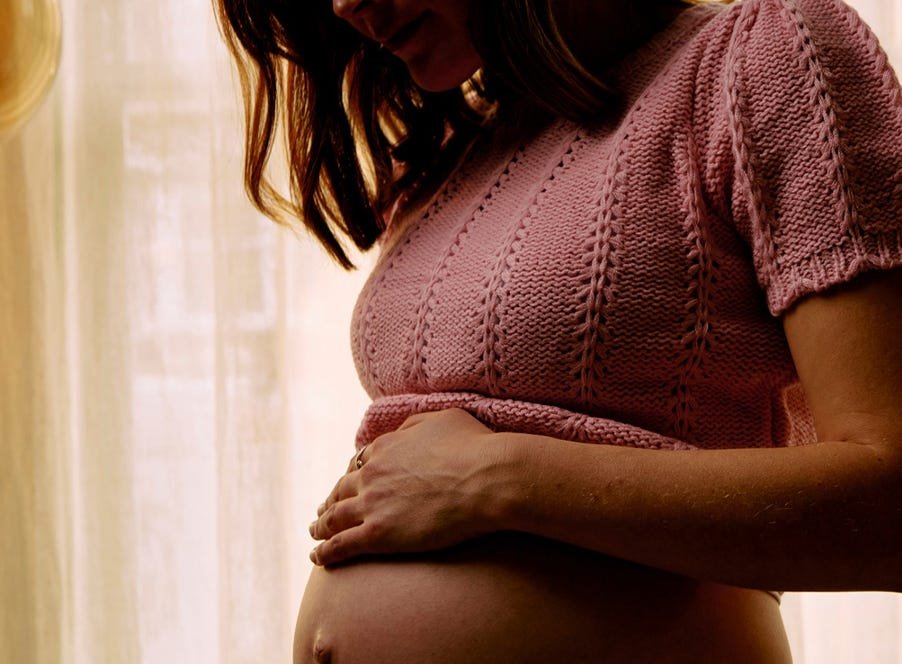
Ultimate XL Nappy Disposal Bundle with 18 Refills
Bundle & Save 40%
Subscription orders can be cancelled at anytime. Free delivery on all subsequent subscription orders. Find out more about subscriptions.
They’re easy and fuss free
Your products are automatically sent to you
You save up to 10% when you sign up for a subscription
You can cancel at any time

Pregnancy is amazing, for a whole host of different reasons - the main one being the birth of your beautiful baby! But the truth is, it also comes with some not-so-amazing little gifts along the way - we're talking morning or pregnancy sickness.
When you're pregnant, your senses are heightened - like Spiderman. Unlike Spiderman, this makes you super sensitive to certain foods and smells. This can bring nausea and vomiting that can have a negative impact on your day-to-day life.
Sickness during pregnancy is not uncommon, in fact, up to 80% of pregnant people experience some nausea and/or vomiting during pregnancy, so you're not alone!
We're here to support you by answering some of the most asked questions about pregnancy sickness and giving you some top tips to cope with the symptoms it brings.
Typically, nausea and vomiting strikes between weeks six and nine of your first trimester - around the same time that cravings commonly start.
Symptoms can appear gradually, with an increased aversion to certain foods and smell over time, or can seem to develop overnight, like a bad hangover.
Although every pregnancy is different, sickness symptoms are usually at their worst around week 10 or 12.
Most people start experiencing nausea and vomiting caused from around six to nine weeks into their pregnancy, and most will notice their symptoms ease at around 16 to 20 weeks.
Some experience morning sickness for longer and can see it last for several months or even into their third trimester.
While uncommon, around one to three in every 100 pregnant people can experience a severe form of morning sickness called hyperemesis gravidarum or HG.
Hyperemesis gravidarum - also referred to as HG - is severe sickness that can make people very ill throughout the entirety of their pregnancy. This can lead to severe dehydration and hospitalisation.
The Duchess of Cambridge, Kate Middleton, suffered from hyperemesis gravidarum during her pregnancies, and according to the NHS, around one to three in every 100 pregnant people in the UK get HG. It's not clear why some people suffer more, although hormone levels and a family history of HG have been noted as potential causes.
Pregnancy Sickness Support is a charity working to improve care, treatment and support for pregnant people suffering from HG.
The Hyperemesis Education and Research Foundation (HER) is a global nonprofit that's dedicated to helping people with hyperemesis gravidarum.
Morning sickness affects every pregnant person differently. Some feel nauseated for a short time each day and vomit once or twice. Others experience nausea that lasts several hours each day and they vomit more often.
Some people liken it to seasickness or car sickness accompanied by hunger pangs, and it can lead to strong aversions to certain smells and foods that can make you sick.
Some report having a metallic taste in their mouth that causes them to feel unwell, and others report excess saliva which can enhance the feeling of queasiness.
If you're not a lover of ginger, now is the time to wean yourself onto it. Ginger can ease symptoms of nausea and vomiting. Ginger tea, biscuits, supplements – there are a bunch of different methods you can try.
According to the NHS, around eight in ten people experience nausea and vomiting while pregnant. So, you can pretty much guarantee that at least one of your mum friends will understand what you're going through.
However, everyone experiences symptoms in very different ways. Some avoid sickness altogether and just have the feeling of nausea throughout their first trimester. Others struggle to eat anything without being sick. If you're in the second group, you should speak to your doctor or midwife.
Every pregnancy is different, and even if you've experienced morning sickness or food aversions in a previous pregnancy, that doesn't mean you'll necessarily experience the same symptoms in this or future pregnancies.
Once you've gotten used to certain pregnancy symptoms, it can be a bit alarming when those symptoms stop or change.
But many pregnancy symptoms can be erratic. You might notice swift changes in your mood, food cravings and even morning sickness - this is normal. One day you may feel totally fine and the next, the sickness may come back with a vengeance.
If you're worried that your pregnancy symptoms have subsided, you can always ask your doctor. But unpredictable and inconsistent morning sickness symptoms are normal and, most of the time, nothing to worry about.
Let's run through some pregnancy sickness remedies you can use to help relieve your symptoms.
You should tell your midwife or doctor or contact the hospital as soon as possible if you:
Pregnancy sickness is typically worse in the first trimester due to increased hormones. Unfortunately, despite the name, this common pregnancy symptom isn't just reserved for the morning. It can hit at any time - day or night.
Although every pregnancy is unique, sickness symptoms will typically ease off between weeks 16 and 20 of your pregnancy.
Morning sickness is thought to be caused by an increase in hormones, and new research has found that an excess of a hormone called GDF15 causes it.
Although it's really unpleasant, pregnancy sickness shouldn't put your baby at any increased risk, but it's important to trust your instinct and seek medical attention if you're concerned.
Morning sickness is caused by increased hormone levels so can be an indicator that you are pregnant, but it isn't a reflection of your baby's health. If you are pregnant and worried about the well-being of your baby, it's best to consult your GP or midwife.